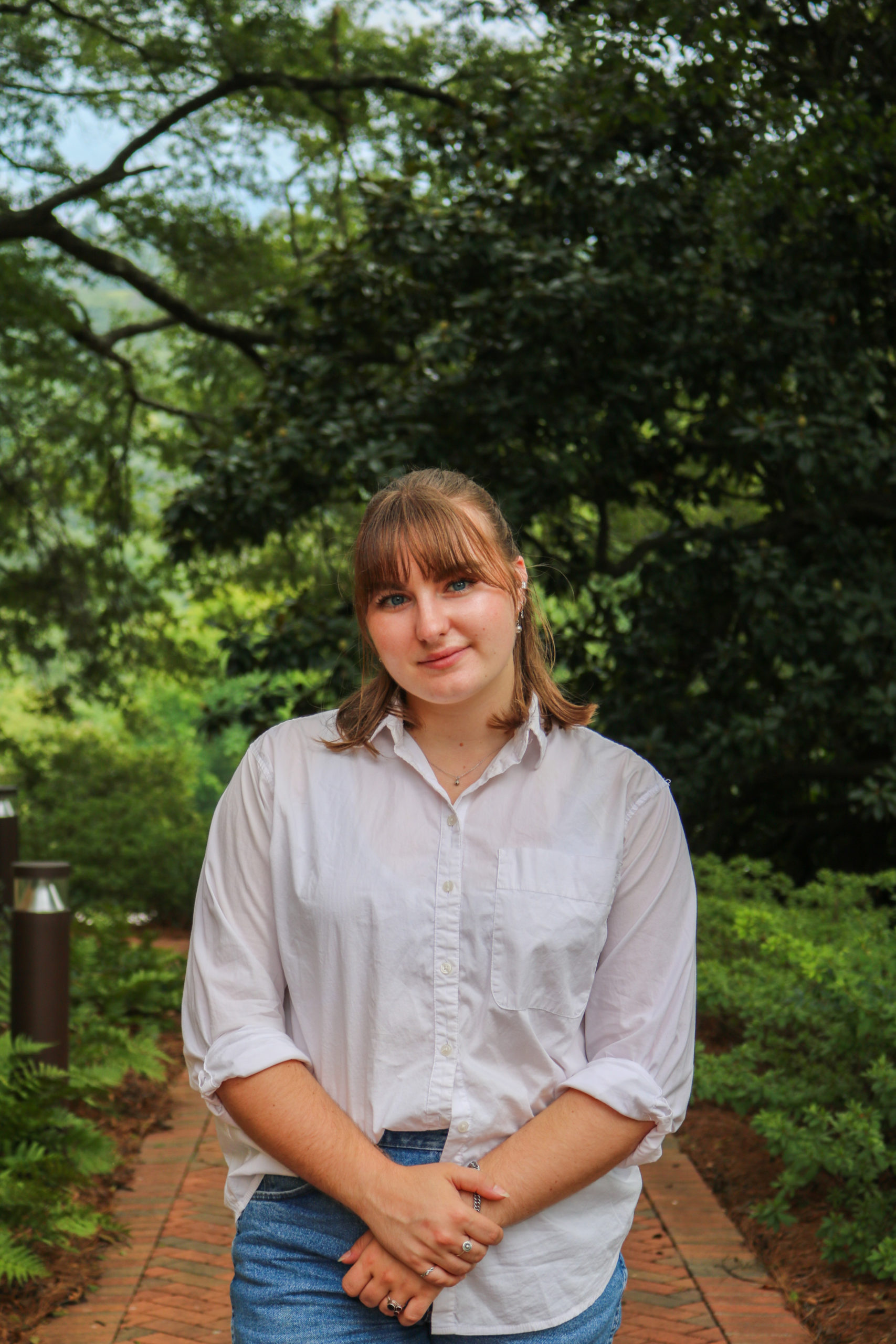On the night of Feb. 19, hushed murmurs and excited whispers floated around the intimate staging of the theater costume shop as students and friends eagerly waited for the production to begin. “Free Human,” the senior capstone project of theater for youth majors Braydie Aldrich and Anna Stevens, tells the story of a young queer man in San Fransisco in the 1980s, which was the time of the AIDS epidemic that killed thousands of people both in the queer community and outside of it.
After being a part of other queer theater productions throughout his time at Samford, Aldrich knew that he wanted to tell a queer story with his senior capstone project. He began writing the script for “Free Human” last summer, and asked Stevens to be his director soon after completing the first copy of the script.
Aldrich felt called to tell a story about the AIDS epidemic in San Fransisco because he considers it to be a part of history that is not often talked about.
“I was very intrigued by the AIDS epidemic just because I feel like that part of history has been overlooked by other parts of history in the 80s which is something that I want to talk about,” Aldrich said.
He also expressed a desire to bring new narratives to Samford that are not often seen on stage.
“I wanted to make a story about the AIDS epidemic, and something that was queer, and something that would have people seen on stage in ways that many Samford audiences have not seen in terms of this type of representation,” Aldrich shared.
When Aldrich asked Stevens, whom he’s worked with and known personally for numerous years, to direct the show for him, he felt completely confident in his decision.
“It was great to have this trust and know that this person was going to tell this story in the best way that they possibly could,” he said.
Director Anna Stevens stated that she and Aldrich have been hoping to work together on a project for a long time.
“We’ve been talking about doing a project together for a few years and we really just wanted to do something that was bold, that was new, that was brave, but also something that made a statement and had an impact on people,” Stevens said. “I’m really proud of this story, and I can’t believe we did it because we’ve been talking about it for so long.”
Stevens compounded on Aldrich’s point that queer stories often do not receive the same amount of recognition and representation on stage at Samford.
“This is why we tell these stories, so that people see themselves on stage and especially here, so they know that they have a voice, and [it] will not be silenced,” Stevens shared. “Seeing themselves on stage I think meant a lot to people.”
Even though Stevens was confident that this story needed to be told, she also communicated some of her fears regarding how the show would be received.
“I was extremely nervous about how the story was going to be received, especially in the weeks leading up to the show. We knew that this was a really brave play, and we were scared, we had no idea how people would respond,” Stevens expressed.
Overall, Stevens hoped to send a message of acceptance to the queer community at Samford.
“I really wanted people to see and hear and experience that queer students at Samford are seen and loved and valued and that they have a place here. We will not be silenced, we will not be ignored, we exist, and we want to exist freely and proudly,” she declared.
Avery Minotti, a junior acting and directing major who is also a member of the queer community at Samford, was the stage manager for the production of “Free Human,” and voiced how the nature of the story relates to larger issues for the queer community at Samford.
“The queer community have just felt so silenced at Samford and so the purpose of this project was really to show some other aspects of other walks of life that people at Samford aren’t exposed to,” Minotti explained. “I have been called a slur on Samford’s campus; my friends [were] hate-crimed after the [silent] protest. Samford is not the safest place for queer people.”
Minotti shares with Aldrich and Stevens the hope that this story will speak to members of the queer community on campus.
“I hope this play was able to reach some audience members and inspire them to talk about what it means to be able to live freely as yourself and what it means to allow yourself the freedom to explore your life and explore what living means to you and what being an artist means and how we’re going to treat others,” they said.
Minotti also commented on how they feel the nature of the show relates to the mission of Samford as a whole.
“I think the show does a really good job of putting love above anything else and I think as Christians that’s exactly what we’re called to do, is to love first,” they explained. “God is love; the entire thing we’re supposed to do as Christians is love others and do unto others as we would like to be done and I think the show is a great demonstration of love.”
Finally, they conveyed the perspective of their fellow theater students and a desire for attitudes surrounding the queer community to improve.
“Something that all of us in the School of the Arts are very aware of is Samford’s view of the queer community and that’s something all of us have witnessed the struggles of at Samford in our time here,” Minotti said. “I think Samford needs to do better.”

Editor-in-Chief





